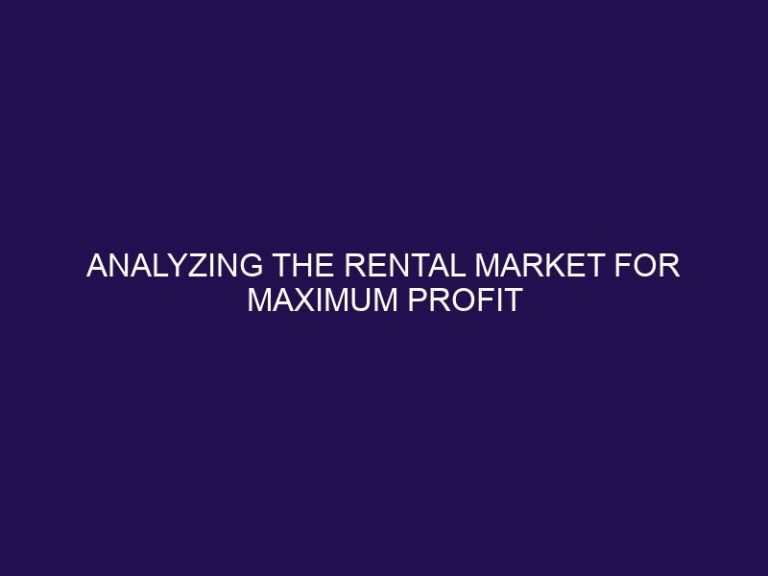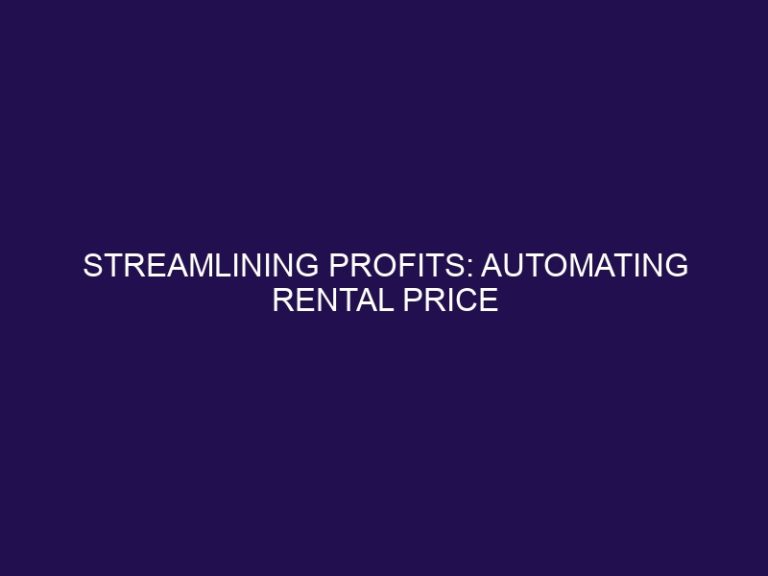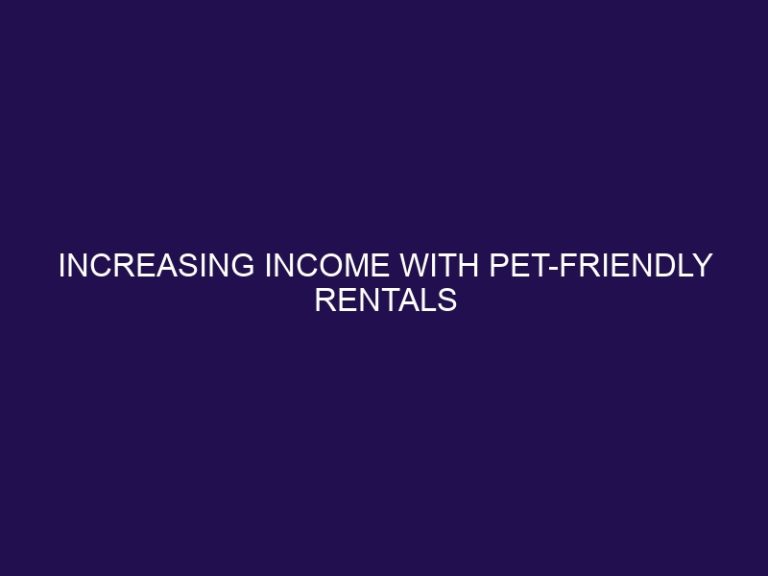Maximizing Occupancy: Tried and Tested Methods for Ensuring Full Tenancy
In the competitive world of real estate, understanding and effectively managing rental vacancy is crucial for property owners and landlords. High vacancy rates can significantly impact property income and overall investment returns, making it essential to grasp the contributing factors and implement proven strategies to minimize vacancies. In this comprehensive guide, we will delve into the factors contributing to rental vacancy, the impact of high vacancy rates on properties, and proven strategies to reduce vacancies.
We will explore methods for retaining good tenants and maximizing long-term tenancy, ultimately providing valuable insights for landlords and property managers seeking to optimize their rental income and investment performance.
Key Takeaways:
Understanding Rental Vacancy
Understanding rental vacancy is essential for property owners and managers in the real estate industry, as it directly impacts the profitability and management of rental properties. It refers to the period when a rental property is unoccupied, and no rental income is being generated.
This can significantly affect property management and cash flow, as owners may struggle to cover mortgage payments and maintenance costs without rental income. High rental vacancy rates can indicate an oversupply of rental properties in a specific area, leading to increased competition among property owners and potentially driving down rental prices.
Awareness of rental vacancy rates is crucial for making informed decisions about property investment and setting suitable rental rates.
Factors contributing to rental vacancy
Several factors contribute to rental vacancy, including fluctuating vacancy rates, tenant turnover, local market conditions, and the effectiveness of rental advertising efforts.
High turnover among tenants can significantly impact rental vacancy rates, as frequent changes in occupancy may lead to extended periods of property vacancy. Local market dynamics such as economic conditions, job growth, and population shifts also play a crucial role in determining the level of rental vacancy within a given area.
The effectiveness of rental advertising strategies and the ability to attract suitable tenants are essential factors in minimizing vacancy rates and maximizing property occupancy.
Impact of high vacancy rates on property
High vacancy rates can significantly impact rental properties, leading to financial strain for property managers and reduced market rents due to an abundance of vacant rental properties in the local market.
The financial strain can arise from the loss of rental income, increased property management expenses, and the need for additional marketing efforts to attract new tenants. Property managers may face challenges in covering mortgage payments, property maintenance costs, and other overheads with a large number of vacant units.
The oversupply of vacant rental properties can lead to a downward pressure on market rents as landlords compete to attract tenants, diminishing the profitability of the properties.
Strategies to Reduce Rental Vacancy
Reducing rental vacancy requires strategic approaches that cater to the local market dynamics, tenant preferences, and effective lease renewal and rental advertising strategies.
Understanding the unique characteristics of the local market is crucial for customizing rental strategies. Engaging with tenants and addressing their needs can improve tenant satisfaction and reduce turnover. Employing proactive lease renewal tactics, such as offering incentives or personalized offers, can foster tenant loyalty and retention. Targeted rental advertising through digital channels and local platforms can effectively reach the right audience, driving interest and reducing vacancy rates.
Understanding the local rental market
Understanding the local rental market is crucial for property owners and managers, as it enables tailored rental advertising strategies and insights into market dynamics through platforms such as Zillow, Zumper, and Property Management Seattle.
By comprehending the local rental market, property owners and managers can effectively position their rental properties to attract suitable tenants and optimize their return on investment. The market insights gained from platforms like Zillow, Zumper, and Property Management Seattle provide invaluable data on rental rates, demand trends, and property management resources. This knowledge can guide pricing strategies, target marketing efforts, and enhance the overall efficiency of rental property operations.
Enhancing property appeal through strategic upgrades
Enhancing the appeal of rental properties through strategic upgrades is a proactive approach that property managers can take to attract tenants and differentiate their rental units in competitive markets such as Redmond and Oakland, California.
Strategic upgrades can encompass various aspects, including aesthetic enhancements, functional improvements, and eco-friendly features that align with market trends. Property managers need to stay updated with the evolving preferences of potential tenants to tailor these upgrades effectively. By investing in modernizing kitchens, bathrooms and implementing energy-efficient systems, property managers can enhance the overall appeal and value of their rental properties. These upgrades not only make the property more attractive but can also justify a premium in rent and contribute to long-term tenant satisfaction.
Utilizing effective marketing techniques
Utilizing effective marketing techniques for rental properties involves leveraging platforms such as Zillow and Yelp, implementing targeted advertising strategies, and emphasizing the value of tenant screening to attract quality tenants in the local market.
It is crucial to understand the reach and audience of various marketing platforms to optimize the visibility of your rental listings. Zillow is renowned for its extensive database of rental properties, providing a valuable platform to showcase your offerings to potential tenants. Similarly, Yelp serves as a powerful tool for property owners to capitalize on word-of-mouth marketing and positive reviews, enhancing the credibility of their rental listings.
Targeted advertising strategies, such as social media promotions and Google AdWords campaigns, allow landlords to reach specific demographics, thus maximizing the impact of their marketing efforts. Identifying and highlighting the unique selling points of your property, whether it’s the location, amenities, or affordability, is pivotal in standing out amidst the competition.
Tenant screening plays a significant role in ensuring a hassle-free rental experience. By conducting thorough background checks, verifying employment and income details, and assessing rental histories, property owners can mitigate the risk of problematic tenants and secure reliable, long-term occupants. This proactive approach strengthens the overall quality of the tenancy, contributing to a positive rental experience for both landlords and tenants.
Optimizing lease terms for peak seasons
Optimizing lease terms for peak seasons requires a long-term mindset and a deep understanding of the local market dynamics, where resources such as AAOA, the American Apartment Owners Association, can provide valuable insights and best practices for lease renewal strategies.
By aligning lease terms with peak demand periods, property owners and managers can capitalize on the seasonal surges in rental interest. Understanding the unique market dynamics influencing rental demands during peak seasons is crucial for maximizing occupancy rates and rental income.
Developing a proactive approach to lease renewal strategies involves evaluating historical data, industry trends, and predictive analytics. Long-term planning enables property stakeholders to anticipate market fluctuations and implement targeted measures to secure high-quality tenants during peak seasons.
Industry associations like AAOA offer comprehensive resources, including market reports, benchmarking data, and networking opportunities, to support knowledge-based decision making and strategic lease adjustments tailored to seasonal demand fluctuations.
Implementing efficient tenant screening practices
Implementing efficient tenant screening practices is critical for rental properties, ensuring compliance with the Fair Housing Act and utilizing resources like Belong PRO to vet potential tenants effectively through rental advertising platforms.
Tenant screening is a crucial step in the rental process. It helps property owners and managers verify the credibility of potential tenants, ensuring that they are reliable and have a good rental history. By conducting thorough screening, property managers can minimize the risk of evictions, property damage, and late payments.
Additionally, effective tenant screening can contribute to maintaining a peaceful and harmonious community within the rental property, fostering positive tenant relations and reducing the likelihood of disputes.
Retaining Good Tenants
Retaining good tenants is a key objective for property management, requiring effective tenant screening, proactive lease renewal approaches, and fair rent increase strategies to foster long-term tenant relationships and property stability.
Tenant screening plays a vital role in this process, enabling property managers to select reliable and responsible tenants who are likely to maintain the property well and fulfill their lease obligations.
Additionally, lease renewal best practices involve proactive communication with tenants, understanding their needs, and offering incentives to encourage them to stay. Fair rent increase approaches necessitate thorough market research, consideration of tenant satisfaction, and transparent communication to justify any adjustments.
Maintaining property condition
Maintaining the condition of rental properties is paramount for property managers, as it directly contributes to tenant satisfaction and property value preservation, particularly in regions with diverse market dynamics such as Florida and Washington State.
When rental properties are well-maintained, it enhances the living experience for tenants, resulting in higher satisfaction levels and better tenant retention. A well-maintained property helps to preserve the value of the asset by minimizing depreciation and increasing long-term appreciation potential.
For property managers, this means staying proactive in handling maintenance issues, conducting regular property inspections, and promptly addressing any concerns raised by tenants. In areas like Florida and Washington State, where market dynamics can fluctuate, attentive property management plays a crucial role in maximizing return on investment and ensuring sustained property value.
Building and nurturing tenant relationships
Building and nurturing positive tenant relationships is an integral part of successful property management, requiring effective tenant screening and engagement strategies, where industry events and resources, such as those organized by Melanie Kershaw on platforms like Eventbrite, can offer valuable insights.
By fostering positive relationships with tenants, property managers can create an environment of trust and open communication, leading to higher tenant satisfaction, longer tenancies, and ultimately, improved property performance. Tenant engagement, through regular communication and feedback mechanisms, plays a pivotal role in understanding tenant needs and preferences, leading to a more tailored and satisfactory rental experience.
Attending industry events, like property management conferences or tenant-focused workshops, can provide property managers with networking opportunities, access to industry best practices, and exposure to the latest trends in tenant relations and housing regulations. These events, often hosted by industry professionals and thought leaders, can provide a platform for property managers to gain insights and exchange experiences, refining their tenant management strategies and adapting to evolving industry standards.
Proactive lease renewal approach
Adopting a proactive approach to lease renewal is essential for maintaining tenant satisfaction and property stability, requiring a long-term mindset and attentive property management practices to ensure consistent lease renewals and tenant retention.
It is vital for property managers to recognize that proactively engaging with tenants about lease renewals fosters a positive relationship and demonstrates a commitment to their satisfaction. By addressing potential renewal concerns well in advance, property managers create a sense of stability for both the tenants and the property itself. This approach not only contributes to tenant satisfaction but also plays a significant role in the overall stability and long-term success of a rental property.
Implementing fair rent increase strategies
Implementing fair rent increase strategies is crucial for balancing market dynamics and tenant affordability, where property managers play a pivotal role in evaluating market rents and implementing reasonable adjustments in line with the local market conditions.
Understanding the local rental market and tenant affordability is essential for property managers to make informed decisions regarding rent increases. By keeping a pulse on the market, managers can identify when it’s appropriate to adjust rents to reflect current demand and local economic conditions. This proactive approach can help maintain a fair balance between landlord profitability and tenant satisfaction, contributing to a healthy and sustainable rental market.
Maximizing Long-Term Tenancy
Maximizing long-term tenancy is a fundamental goal for rental business success, requiring a strategic long-term mindset, effective lease renewal practices, and proactive property management to cultivate lasting tenant relationships and property stability.
One key strategy involves fostering an open line of communication with tenants, addressing their concerns promptly, and maintaining the property to a high standard.
Additionally, implementing initiatives to improve tenant satisfaction, such as community events, referral programs, and loyalty incentives, can significantly boost tenant retention rates and lease renewals. It’s vital to stay attuned to market trends and adjust rental pricing judiciously, balancing profit margins with tenant affordability to incentivize long-term residency. Consistently demonstrating respect, reliability, and responsiveness as a landlord leads to a higher likelihood of prolonged tenant occupancy and a more sustainable rental property business.
Frequently Asked Questions
What are some proven strategies for avoiding vacancy?
There are several strategies for keeping your rental units filled, including marketing effectively, maintaining good tenant relationships, and offering competitive rental rates.
How can marketing effectively help avoid vacancy?
Effective marketing involves utilizing various platforms, such as online listings, social media, and word-of-mouth referrals, to reach a wide audience of potential tenants. This increases the chances of finding a suitable tenant quickly and avoiding a prolonged vacancy.
Why is maintaining good tenant relationships important for avoiding vacancy?
When tenants feel valued and respected, they are more likely to renew their lease and refer others to your property. Keeping open communication, addressing concerns promptly, and providing quality amenities can help maintain good tenant relationships and reduce turnover.
What role do competitive rental rates play in avoiding vacancy?
In a competitive rental market, setting the right rental rate is crucial for attracting and retaining tenants. Conducting market research and setting a competitive price can help keep your units filled and avoid vacancy.
What are some other tactics for avoiding vacancy?
Other tactics include offering incentives, such as a rent discount for longer lease terms, or making necessary improvements to your rental units to make them more attractive to potential tenants.
How can regular maintenance help prevent vacancy?
Regular maintenance and timely repairs can help retain tenants and attract new ones. A well-maintained property shows that you care about your tenants and their living environment, making them more likely to renew their lease and recommend your property to others.







